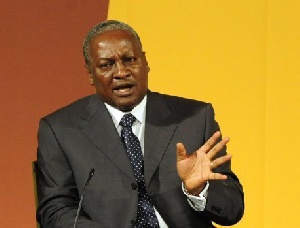President John Mahama must set for his ministers “specific performance benchmarks” by which members of the public can hold them accountable, said business leaders who attended the Ghana Economic Forum (GEF) last week.
The discussions at the forum centred on leadership, and various speakers agreed that setting performance targets for ministers would go a long way to ensure accountability.
“One recommendation from this meeting is that we as a public want to see benchmarks for each minister and then at the end of the day we will judge them as a public,” Professor Kwaku Atuahene-Gima of the China Europe International Business School (CEIBS) said.
“If people are employed to work and they do not deliver, they should be sacked. The challenge we have in this country is that it is very difficult to sack people. In the public sector, I don’t think it happens. In the private sector also, sometimes the labour law restricts you,” said Edward Boateng, Executive Chairman of Global Media Alliance.
Asked at the forum whether he had a performance target to meet, the Minister of State responsible for Public-Private Partnerships, Rashid Pelpuo, responded: “When you take over a ministry, in the handing-over notes they tell you where they have gotten to and where they want to take the ministry. So it is expected that you then report to Cabinet about what you are about to do and you are monitored by your colleagues.
“In the end nobody will ask you, anyway, whether you have fulfilled them or not; but it must seem that judgement will come from the public. But I think it is a new dimension you are bringing into the show that there must be some benchmarks, that there must be some targets; and I think that it is something I would like to discuss at the presidency.”
Achieving results in the public sector has been a thorny issue in the country, as implementation of projects in sectors like roads, energy, water and sanitation among others tend to drag on for years -- if they happen at all.
Compelled by the appalling situation, the World Bank Office in Ghana disclosed recently that about 13 out of 26 projects it is funding in the country had run far beyond their completion dates, resulting in some US$1.5billion -- out of US$2.3billion approved in total -- remaining in the bank’s chest.
The business leaders reasoned that if the president sets targets for his ministers and they do the same for those under them, the country could well be on its way to coming out of the woods. “The president should fire his ministers; they should fire people who don’t work. Chief Directors should fire their colleagues who don’t work. It should trickle down. Once we have that system working, people will be responsible,” insisted Edward Boateng.
Touching on the qualities required of a leader, Prince Kofi Amoabeng of the UT Group, said a leader must have good values and be able to surround himself with people who have similar values to help him achieve his aim.
“When you have someone with good values you can hope to have a good leader; the person with good values will normally repel people with bad values and attract people with good values,” he said.
“When you surround yourself with like minds -- people who have values -- and affect them with your values, then together you can envision where you want to go,” he added.
On her part, the CEO of Stratcomm Africa, Esther Cobbah, said Ghana has the potential for prosperity, which it could lose for want of the right leadership.
We must have leaders that are able to inspire and mobilise the country to fix its problems, she said, adding that “in the face of the rapid growth of the Ghanaian economy we cannot fail to see the enormous challenge of poverty that is still staring us in the face.
“Many Ghanaians have a hard time making ends meet, and we cannot fail to realise the danger that is posed to prosperity if it is just enjoyed by a few while the large majority endure poverty and inequality.”
Business News of Wednesday, 20 March 2013
Source: B&FT

















